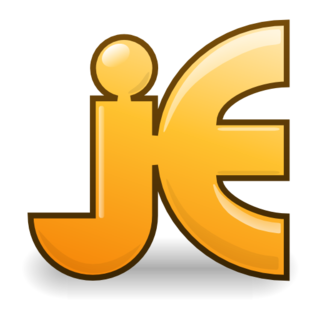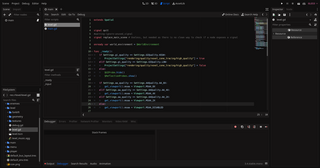Related Research Articles
The editor war is the rivalry between users of the Emacs and vi text editors. The rivalry has become an enduring part of hacker culture and the free software community.
Emacs Lisp is a Lisp dialect made for Emacs. It is used for implementing most of the editing functionality built into Emacs, the remainder being written in C, as is the Lisp interpreter.
An integrated development environment (IDE) is a software application that provides comprehensive facilities for software development. An IDE normally consists of at least a source-code editor, build automation tools, and a debugger. Some IDEs, such as IntelliJ IDEA, Eclipse and Lazarus contain the necessary compiler, interpreter or both; others, such as SharpDevelop and NetBeans, do not.

A text editor is a type of computer program that edits plain text. An example of such program is "notepad" software. Text editors are provided with operating systems and software development packages, and can be used to change files such as configuration files, documentation files and programming language source code.

vi is a screen-oriented text editor originally created for the Unix operating system. The portable subset of the behavior of vi and programs based on it, and the ex editor language supported within these programs, is described by the Single Unix Specification and POSIX.

XEmacs is a graphical- and console-based text editor which runs on almost any Unix-like operating system as well as Microsoft Windows. XEmacs is a fork, based on a version of GNU Emacs from the late 1980s. Any user can download, use, and modify XEmacs as free software available under the GNU General Public License version 2 or any later version.
BASIC09 is a structured BASIC programming language dialect developed by Microware on behalf of Motorola for the then-new Motorola 6809 CPU and released in February 1980. It is primarily used with the OS-9 operating system, released in 1979. Microware also released a version for OS-9/68k on the 68000 as Microware BASIC.
A text file is a kind of computer file that is structured as a sequence of lines of electronic text. A text file exists stored as data within a computer file system.

Comma-separated values (CSV) is a text file format that uses commas to separate values, and newlines to separate records. A CSV file stores tabular data in plain text, where each line of the file typically represents one data record. Each record consists of the same number of fields, and these are separated by commas in the CSV file. If the field delimiter itself may appear within a field, fields can be surrounded with quotation marks.

Macintosh Programmer's Workshop (MPW) is a software development environment for the Classic Mac OS operating system, written by Apple Computer. For Macintosh developers, it was one of the primary tools for building applications for System 7.x and Mac OS 8.x and 9.x. Initially MPW was available for purchase as part of Apple's professional developers program, but Apple made it a free download after it was superseded by CodeWarrior. On Mac OS X it was replaced by the Project Builder IDE, which eventually became Xcode.

jEdit is a free software text editor available under GPL-2.0-or-later. It is written in Java and runs on any operating system with Java support, including BSD, Linux, macOS and Windows.

A source-code editor is a text editor program designed specifically for editing source code of computer programs. It may be a standalone application or it may be built into an integrated development environment (IDE).
This article provides basic comparisons for notable text editors. More feature details for text editors are available from the Category of text editor features and from the individual products' articles. This article may not be up-to-date or necessarily all-inclusive.
Sprint is a text-based word processor for MS-DOS, first published by Borland in 1987.

Brief, is a once-popular programmer's text editor in the 1980s and early 1990s. It was originally released for MS-DOS, then IBM OS/2 and Microsoft Windows. The Brief interface and functionality live on, including via the SourceForgeGRIEF editor.
GNU Emacs is a text editor and suite of free software tools. Its development began in 1984 by GNU Project founder Richard Stallman, based on the Emacs editor developed for Unix operating systems. GNU Emacs has been a central component of the GNU project and a flagship project of the free software movement.
Emacs, originally named EMACS, is a family of text editors that are characterized by their extensibility. The manual for the most widely used variant, GNU Emacs, describes it as "the extensible, customizable, self-documenting, real-time display editor". Development of the first Emacs began in the mid-1970s, and work on GNU Emacs, directly descended from the original, is ongoing; its latest version is 29.4 , released June 2024.

In computing, a script is a relatively short and simple set of instructions that typically automate an otherwise manual process. The act of writing a script is called scripting. Scripting language or script language describes a programming language that is used for scripting.
MINCE is a text editor, originally created for 8080-based microcomputers running the CP/M operating system. Later versions of MINCE were available for GEMDOS on the Atari ST, VAX/VMS, RSX-11, and various flavors of Unix.
References
- ↑ Lugaru.com
- ↑ "Advertisement: Epsilon by Lugaru Software, Ltd. The most advanced, customizable programmer's editor you can buy". Dr. Dobb's Journal. May 1986. p. 33.
- ↑ "The BYTE Awards". BYTE. January 1989. p. 327.
